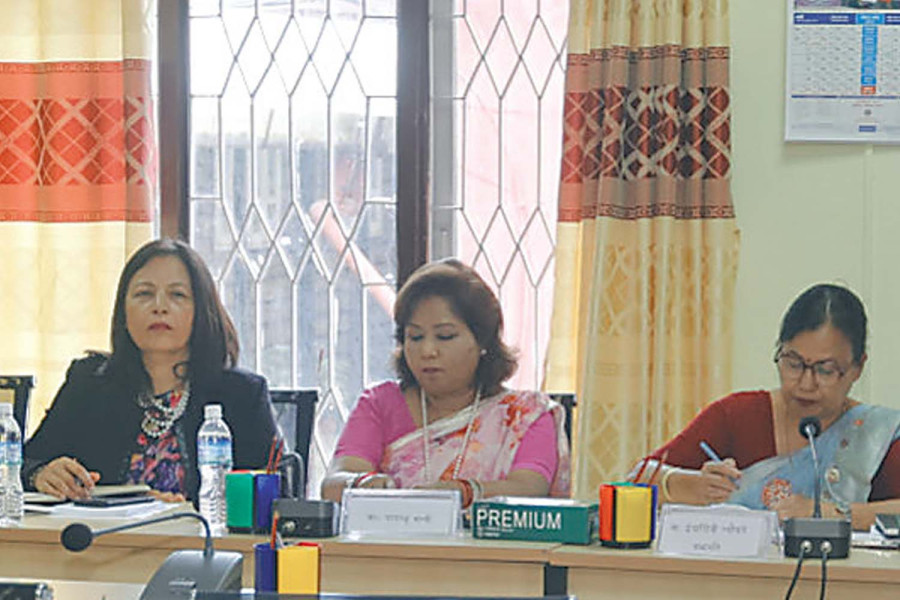National
Following backlash, government promises to pick envoys on the basis of inclusiveness
The parliamentary hearing special committee on Monday inquired Foreign Minister Arzu Rana why the government failed to make the appointments inclusive as per the spirit of the constitution.
Post Report
The ambassadorial recommendations have become controversial once again. Be it the failure to meet the criteria of inclusiveness or the insensitive and superficial responses made by the proposed envoys, the ambassadorial nomination for 17 countries have landed in troubled waters.
Taking an exception to the nomination, the parliamentary hearing special committee on Monday summoned Foreign Minister Arzu Rana and inquired why the government failed to meet the constitutional criteria and make the appointments inclusive.
On July 29, the government recommended 17 ambassadors and recalled some. But the recommendations have failed to catch the spirit of inclusiveness and have flouted the mandatory constitutional provision. Meanwhile, the parliament hearing special committee has already completed the hearing of 13 proposed envoys.
During the meeting on Monday, several cross-party lawmakers criticised the ambassadorial recommendations.
Even ruling party lawmakers have criticised the ambassadorial appointment and complained about it with Foreign Minister Rana.
The government has failed to recommend ambassadors from Muslim, Madheshi and Dalit communities, said Gyanendra Bahadur Karki, a Nepali Congress lawmaker. “I request the government to nominate ambassadors from underrepresented communities as per the spirit of constitution while filling the remaining vacancies,” Karki said.
Meanwhile, Mahesh Bartaula of CPN-UML said that they have failed to uphold the spirit of the constitution despite leading a strong government of two major parties. “We have also failed to assess and review the performance of the serving ambassadors,” Bartaula said.
Bartaula then asked a series of rhetorical questions.
“Does the Ministry of Foreign Affairs keep the record of ambassadors about what they commit in the committee and what they actually do?” he said. “Does the foreign ministry have a record of such statements? Why do we recall ambassadors after every change in the government? And what commitment do we make that we will uphold the constitutional provisions?”
Likewise, Dol Prasad Aryal of Rastriya Swatantra Party reminded the minister about the constitutional provision on ambassadorial appointment and about complaints registered against the proposed ambassadors. “As soon as the government changes, we recall the ambassadors,” said Aryal. “Such decisions definitely undermine diplomatic conduct. An ambassador should complete his or her full term.”
Moreover, Anand Prasad Dhungana of Nepali Congress, Ishowari Gharti of UML, Prakash Adhikari of Janata Samajbai Party, Bhagawati Neupane of UML and other lawmakers criticised the ambassadorial recommendation for failing to uphold the spirit of the constitution.
After hearing criticisms from lawmakers, Foreign Minister Rana admitted that the ambassadorial recommendation could not become inclusive but committed that the government will make it more inclusive in the days to come.
The government had recommended Naresh Bikram Dhakal (Saudi Arabia), Prof. Dr. Kapilman Shrestha (South Africa), Prof. Dhana Prasad Pandit (Israel), Ram Krishna Bhattarai (Sri Lanka), Sanil Nepal (Spain), and Dr. Shail Rupakheti (Germany) as ambassadors.
The recommendation of Kanta Rijal to Australia was later changed and recently the government has recommended the name of Chitra Lekha Yadav to the post. The incumbent foreign secretary Sewa Lamasal has been recommended for EU and Brussels but both nominations have not been sent to the parliamentary hearing special committee.
Similarly, Lok Darshan Regmi (USA), Chandra Kumar Ghimire (UK), Dr. Shiva Maya Tumbahamphe (South Korea), Junga Bahadur Chauhan (Russia), Ramesh Chandra Poudel (Qatar), Prof. Dr. Krishna Prasad Oli (China), Dr. Sumnima Tuladhar (Denmark), Dr. Netra Prasad Timilsina (Malaysia), Prakash Mani Pokhrel (Portugal) and Rita Dhital (Pakistan) are among those recommended as ambassadors.
“The government’s policy is to take maximum benefit of the ambassador’s experience and expertise,” Rana said. “And we tried our best to make the ambassadorial nomination inclusive as per the spirit of the constitution… Those clusters which have failed to get a chance this time will be accommodated next time.”
While responding to the queries of lawmakers, Rana said the government has been conducting its foreign relations and diplomacy in favour of national interest.
“The government is committed to advancing Nepal’s national interest through ambassadors and diplomatic missions,” Rana said.
Rana added that the Cabinet has recently decided to ensure women participation in every government delegation that has more than one delegate.




 10.12°C Kathmandu
10.12°C Kathmandu













